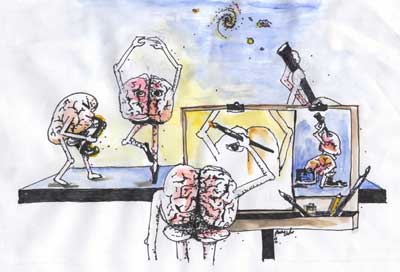|
"Science" has meant different things at different times in history, means different things to different people at the same time time (such as the present), and can mean different things to the same person at different points in their own lifetime. To put it differently "science" is, like many things, an evolving concept, one that derives its significance in part from a continual and public challenging and revision of its meaning.
Science as Story Telling
I believe the
intellectual life
of the whole of western society is increasingly being split into two groups.
When I say the intellectual life, I mean to include also a large part of
our practical life, because I should be the last person to suggest the two
can at the deepest level be distinguished ... Literary intellectuals at
one pole - at the other scientists ... Between the two a gulf of mutual
incomprehension - sometimes (particularly among the young) hostitility and
dislike, but most of all lack of understanding ... This polarisation is
sheer loss to us all. To us as people, and to our society. It is at the
same time practical and intellectual and creative loss, and I repeat that
it is false to imagine that those three considerations are clearly separable.
C.P. Snow, The Two Cultures
Socrates and Plato suggested that if we tried hard enough we should find beliefs which everybody
found intuitively plausible, and that among these would be moral
beliefs whose implications, when clearly realized, would make us
virtuous as well as knowledgeable... unwobbling pivots that determine
the answer to the question: Which moral or political alternative is objectively
valid? For Deweyan pragmatists like me, history and anthropology are
enough to show that there are no unwobbling pivots, and that seeking
objectivity is just a matter of getting as much intersubjective
agreement as you can manage.
Richard Rorty, Trotsky and the Wild Orchids
If the natural sciences can be successfully united with the social
sciences and the humanities, the liberal arts in higher education will
be revitalized ... The future of the liberal arts lies ... in
addressing the fundamental questions of human existence head on,
without embarrassment or fear, taking them from the top down in easily
understandable language, and progressively rearranging them into
domains of inquiry that unite the best of science and the humanities at
each level of organization in turn.
E.O. Wilson, Consilience
Both science itself, and the human culture of which
it is a part, would benefit from a story of science that encourages
wider engagement with and participation in the processes of scientific
exploration... It is the story of science as story telling
and story revising. The story of science as story suggests that science
can and should serve three distinctive functions for humanity:
providing stories that may increase (but never guarantee) human
well-being, serving as a supportive nexus for human exploration and
story telling in general, and exemplifying a commitment to skepticism
and a resulting open-ended and continuing exploration of what might yet
be.
Revisiting Science in Culture
Science has the potential to be what we all
collectively need as we evolve into a world wide community: a nexus
point that encourages and supports the evolution of shared human
stories of exploration and growth, an evolution in which all human
beings are involved and take pride. For this to happen, we all need to
work much harder to not only reduce the perception of science as a
specialized and isolated activity of the few but to make it in fact the
product and property of all human beings...
Revisiting Science in Culture
|
